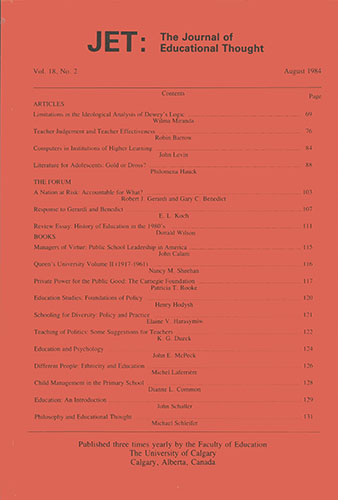Teacher Judgement and Teacher Effectiveness
DOI:
https://doi.org/10.55016/ojs/jet.v18i2.44016Abstract
Sanders' recent argument that differences in teacher behavior do not have any significant effect on levels of student achievement is flawed. His criticisms of research into teacher effectiveness are cogent but apply no less to the research into social factors that he cites to support his view. It is argued that what is really being revealed is the inevitable inadequacy of empirical research for contributing to knowledge of cause and effect in the classroom. Consequently, teacher education should concentrate more on developing conceptual finesse to enable teachers to judge for themselves what they should do in the classroom and to treat empirical research more skeptically.Downloads
Published
2018-05-16
Issue
Section
Articles
License
The Journal of Educational Thought retains first publication rights for all articles. The Journal grants reproduction rights for noncommercial educational purposes with the provision that full acknowledgement of the work’s source be noted on each copy. The Journal will redirect to the appropriate authors any inquiries for further commercial publication of individual articles. All authors wishing to publish in JET will be asked to fill in and sign a Consent to Publish and Transfer of Copyright agreement.
Authors must affirm that any submission to JET has not been and will not be published or submitted elsewhere while under considration by JET.

